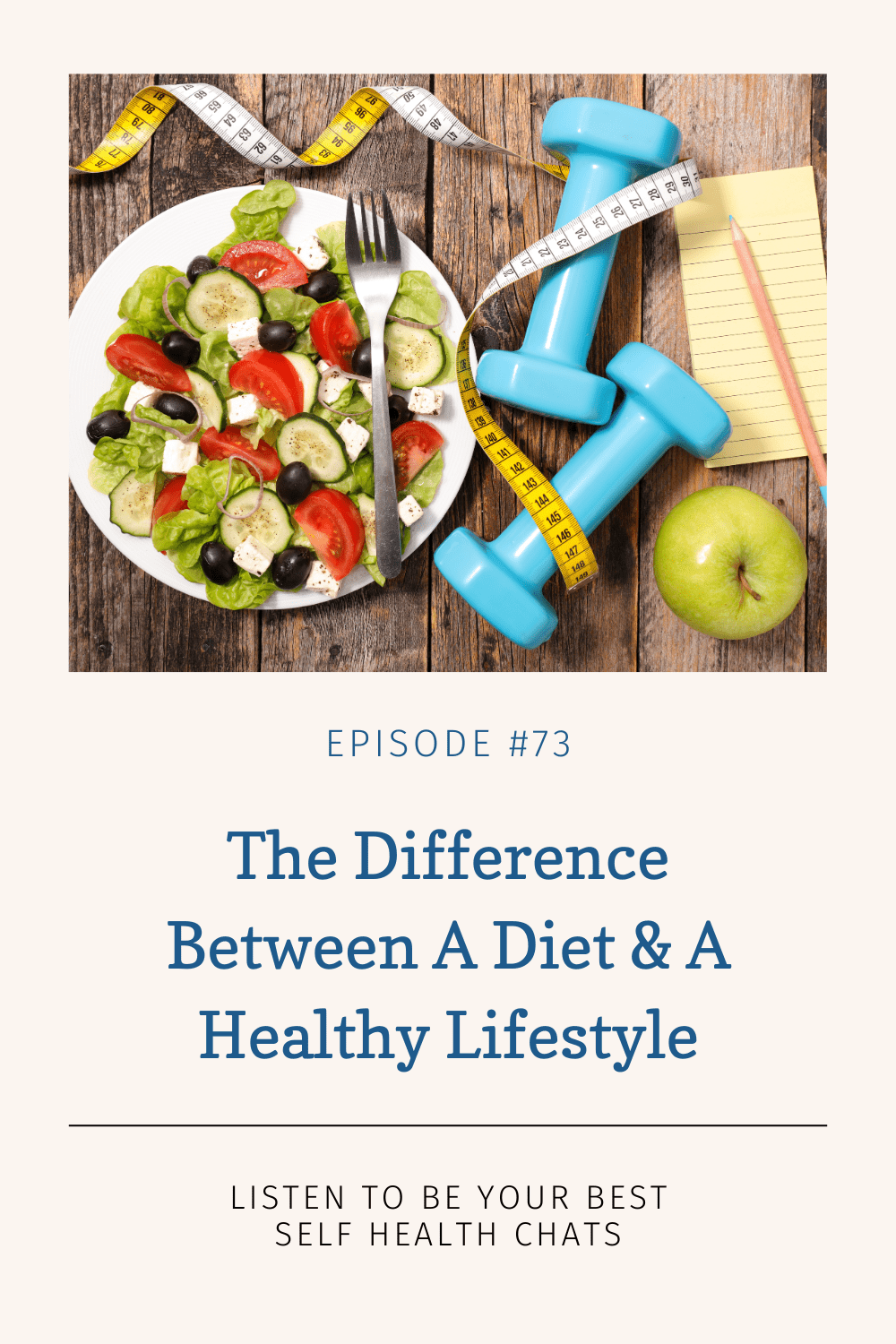June 13, 2023
Today’s podcast will be a little different than what we normally do. Usually, I record by myself and upload it later. However, I recently started a new community called Healthy Mom Lifestyle, where we are ditching the “hot girl” trend and focusing on building a healthy lifestyle for ourselves and our families.
As part of the community, I will also provide bi-weekly live training. To give you a glimpse into what the community will be getting, I’m going to invite you to this week’s live training, where we will talk about diet vs. lifestyle.
Let’s talk about diet vs. lifestyle.
It felt like an appropriate topic for our first live training as this is the Healthy Mom Lifestyle community. I also feel like both can sometimes get a bad reputation, so i think it’s an important topic to talk about.
There is this phrase, “it’s a lifestyle, not a diet,” that I see EVERYWHERE.
It’s used to shame people; it’s used to encourage people; it’s in gyms; it’s on social media, etc.
It’s true health should be a lifestyle. It should have no end date; your health doesn’t suddenly stop mattering after your best friend’s wedding.
But a diet can be PART of that lifestyle.
That’s what I want to talk about today. How these two phrases actually work together to provide you with the best outcome possible.
Let’s start by defining them both from the Oxford Dictionary.
Lifestyle: the way in which a person or group lives.
Diet (noun):
- the kinds of food that a person, animal, or community habitually eats.
- a special course of food to which one restricts oneself, either to lose weight or for medical reasons.
In today’s discussion, we’re going to focus on the second definition.
Let’s talk about building a long-term healthy lifestyle, and then we’ll talk about how diet plays into that. Our lifestyle is built up of several habits that make us the healthiest version of ourselves.
Habits that make up a long-term healthy lifestyle:
- Sleep
- Nutrition
- Hydration
- Movement
- Stress Levels
- Community
So how do diet and lifestyle go together?
As I mentioned at the start, a lifestyle has no end date. It is the way we live and the way we intend to keep living.
One of those habits is the food we eat, which may mean being on a diet. A diet SHOULD have an end date…. Or an end goal, especially when the diet is focused on weight loss.
Think about it.
Despite living a healthy lifestyle, you want to lose 10lbs.
That’s okay; you shouldn’t be shamed for it. In the “macro world,” it’s referred to as a cut. They “cut the macros” for 8-12 weeks to help lean out or lose body fat. If you’ve heard that phrase and thought it sounded cool because it’s not a diet, believe it or not, a cut is a diet.
You can be the healthiest version of yourself but know that you need to make that change; you need to go on a diet.
It might mean restricting for a short time.
As part of your healthy lifestyle, you will need to look at your timeline and your goal and work with someone who can help you safely restrict… and not to 1200 calories… not even 1600 calories…
Why Should a Diet Have a Timeline?
The key is having an end date or an end goal. You aren’t going to restrict yourself for the rest of your life. That is not becoming the healthiest version of you.
To see a change in your body, the goal should be to make a change in your habits for a short period, usually 8-12 weeks or maybe longer, depending on your goals.
If you were to plan to do it for the rest of your life, there is going to be a point where you plateau and things might start working against you.
I don’t love to use the example of bodybuilders because I definitely think there is a lot of disordered eating there and not exactly comparable to every day life but since they are the extreme, it’s a good way to show how it can affect you.
When someone does bikini competitions, they go into a “prep” mode. They restrict, restrict, restrict. The goal is to be as lean as humanly possible. Now in this case many will lose their period as this kind of restriction can actually really trigger hormone imbalance.
Once their competition is over they go back to eating “in maintenance” to build muscle, and rebalance hormones until their next competition. The goal for them is to use the increased food to add more muscle and then restrict again.
Again, it’s not necessarily comparable but it’s a good example of how fueling is important and staying in a deficient isn’t always great long term.
Together Diet + Lifestyle = Long Term Health
There is nothing wrong with being on a diet, despite what we are constantly told, “make it a lifestyle not a diet”… it is okay to diet as part of your healthy lifestyle…
Your lifestyle is still ongoing throughout this diet. You are STILL stepping through each of those habits; maybe they’re changing slightly… maybe you’re increasing the weight your lifting or moving a little more… maybe you’re restricting food A LITTLE, but the overall healthy lifestyle you have been living is still going.
Whether a diet is in your future or not, the lifestyle should be and it’s great to look at it that way. It’s all about those little habits and making adjustments to them as you go.
Focus on the little everyday steps but don’t let someone shame you if you decide that now is a good time to focus on a diet.
What habits are you currently focusing on?
ABOUT ME

Hey There, I’m Kristin, a gluten-free nutrition coach helping gluten-free families adjust to their new lifestyle.





